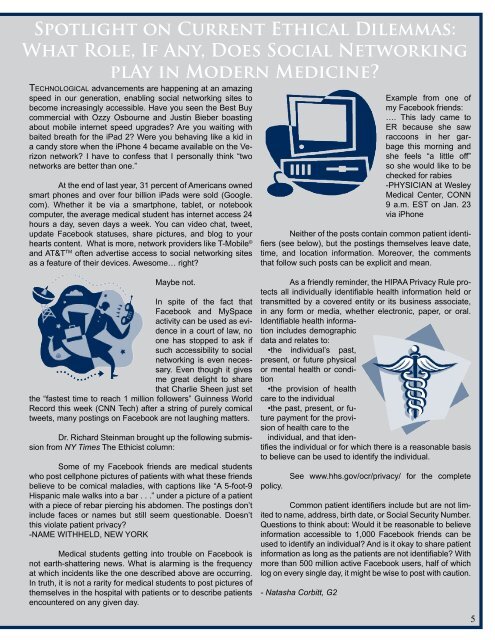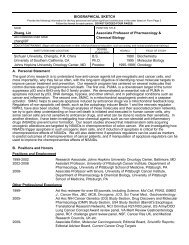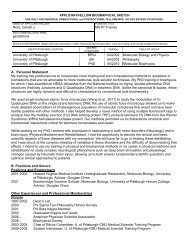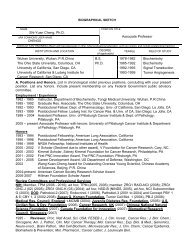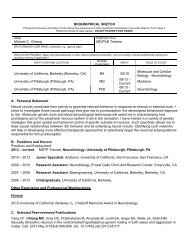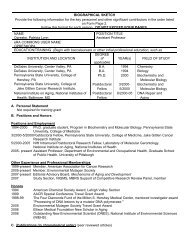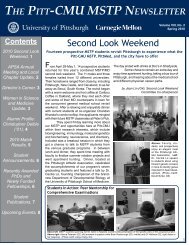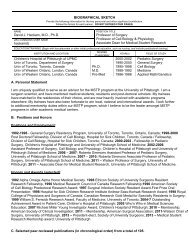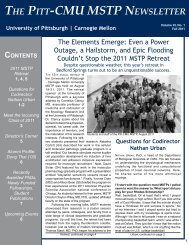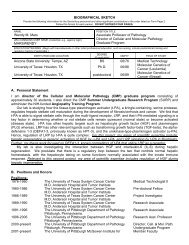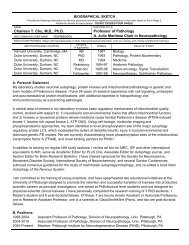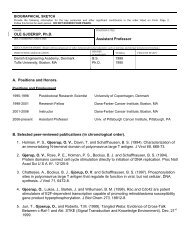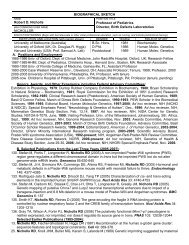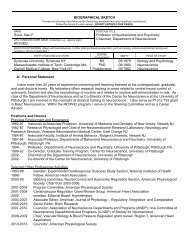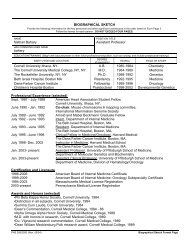The PiTT-CMU MSTP NewSleTTer - University of Pittsburgh :: MSTP
The PiTT-CMU MSTP NewSleTTer - University of Pittsburgh :: MSTP
The PiTT-CMU MSTP NewSleTTer - University of Pittsburgh :: MSTP
Create successful ePaper yourself
Turn your PDF publications into a flip-book with our unique Google optimized e-Paper software.
Spotlight on Current Ethical Dilemmas:<br />
What Role, If Any, Does Social Networking<br />
plAy in Modern Medicine<br />
Technological advancements are happening at an amazing<br />
speed in our generation, enabling social networking sites to<br />
become increasingly accessible. Have you seen the Best Buy<br />
commercial with Ozzy Osbourne and Justin Bieber boasting<br />
about mobile internet speed upgrades Are you waiting with<br />
baited breath for the iPad 2 Were you behaving like a kid in<br />
a candy store when the iPhone 4 became available on the Verizon<br />
network I have to confess that I personally think “two<br />
networks are better than one.”<br />
At the end <strong>of</strong> last year, 31 percent <strong>of</strong> Americans owned<br />
smart phones and over four billion iPads were sold (Google.<br />
com). Whether it be via a smartphone, tablet, or notebook<br />
computer, the average medical student has internet access 24<br />
hours a day, seven days a week. You can video chat, tweet,<br />
update Facebook statuses, share pictures, and blog to your<br />
hearts content. What is more, network providers like T-Mobile ©<br />
and AT&T TM <strong>of</strong>ten advertise access to social networking sites<br />
as a feature <strong>of</strong> their devices. Awesome… right<br />
Example from one <strong>of</strong><br />
my Facebook friends:<br />
…. This lady came to<br />
ER because she saw<br />
raccoons in her garbage<br />
this morning and<br />
she feels “a little <strong>of</strong>f”<br />
so she would like to be<br />
checked for rabies<br />
-PHYSICIAN at Wesley<br />
Medical Center, CONN<br />
9 a.m. EST on Jan. 23<br />
via iPhone<br />
Neither <strong>of</strong> the posts contain common patient identifiers<br />
(see below), but the postings themselves leave date,<br />
time, and location information. Moreover, the comments<br />
that follow such posts can be explicit and mean.<br />
Maybe not.<br />
In spite <strong>of</strong> the fact that<br />
Facebook and MySpace<br />
activity can be used as evidence<br />
in a court <strong>of</strong> law, no<br />
one has stopped to ask if<br />
such accessibility to social<br />
networking is even necessary.<br />
Even though it gives<br />
me great delight to share<br />
that Charlie Sheen just set<br />
the “fastest time to reach 1 million followers” Guinness World<br />
Record this week (CNN Tech) after a string <strong>of</strong> purely comical<br />
tweets, many postings on Facebook are not laughing matters.<br />
Dr. Richard Steinman brought up the following submission<br />
from NY Times <strong>The</strong> Ethicist column:<br />
Some <strong>of</strong> my Facebook friends are medical students<br />
who post cellphone pictures <strong>of</strong> patients with what these friends<br />
believe to be comical maladies, with captions like “A 5-foot-9<br />
Hispanic male walks into a bar . . .” under a picture <strong>of</strong> a patient<br />
with a piece <strong>of</strong> rebar piercing his abdomen. <strong>The</strong> postings don’t<br />
include faces or names but still seem questionable. Doesn’t<br />
this violate patient privacy<br />
-NAME WITHHELD, NEW YORK<br />
Medical students getting into trouble on Facebook is<br />
not earth-shattering news. What is alarming is the frequency<br />
at which incidents like the one described above are occurring.<br />
In truth, it is not a rarity for medical students to post pictures <strong>of</strong><br />
themselves in the hospital with patients or to describe patients<br />
encountered on any given day.<br />
As a friendly reminder, the HIPAA Privacy Rule protects<br />
all individually identifiable health information held or<br />
transmitted by a covered entity or its business associate,<br />
in any form or media, whether electronic, paper, or oral.<br />
Identifiable health information<br />
includes demographic<br />
data and relates to:<br />
•the individual’s past,<br />
present, or future physical<br />
or mental health or condition<br />
•the provision <strong>of</strong> health<br />
care to the individual<br />
•the past, present, or future<br />
payment for the provision<br />
<strong>of</strong> health care to the<br />
individual, and that identifies<br />
the individual or for which there is a reasonable basis<br />
to believe can be used to identify the individual.<br />
policy.<br />
See www.hhs.gov/ocr/privacy/ for the complete<br />
Common patient identifiers include but are not limited<br />
to name, address, birth date, or Social Security Number.<br />
Questions to think about: Would it be reasonable to believe<br />
information accessible to 1,000 Facebook friends can be<br />
used to identify an individual And is it okay to share patient<br />
information as long as the patients are not identifiable With<br />
more than 500 million active Facebook users, half <strong>of</strong> which<br />
log on every single day, it might be wise to post with caution.<br />
- Natasha Corbitt, G2<br />
5


